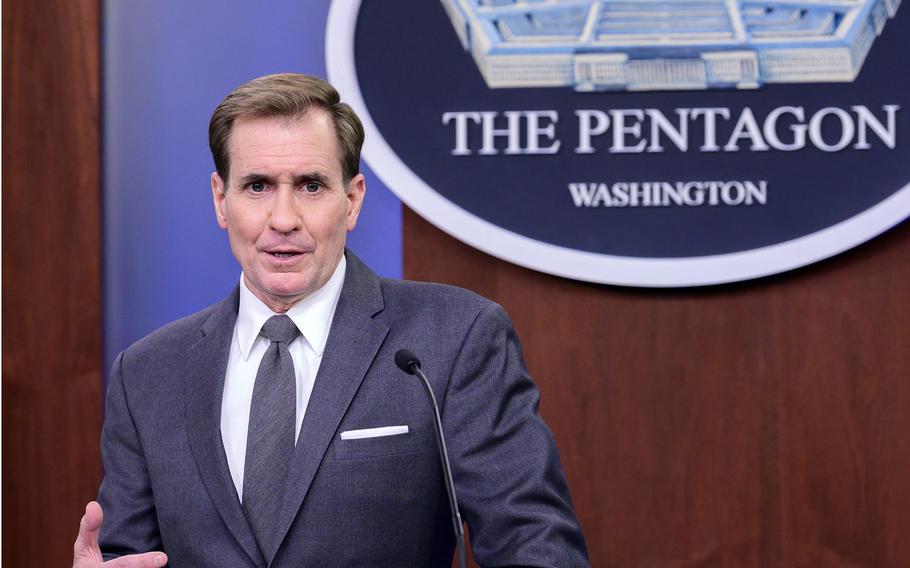
Pentagon spokesman John Kirby, shown here during an April press conference, condemned a Taliban rocket attack on Kandahar Airfield in Afghanistan on Wednesday. The attack did not injure any U.S. troops. (Brittany A. Chase/Defense Department)
KABUL, Afghanistan — The Taliban fired rockets at Kandahar Airfield, causing no damage or casualties but drawing a swift condemnation from the Pentagon which said the attack was “disruptive” to peace negotiations.
Pentagon spokesman John Kirby declined to say whether the Wednesday attack violated last year’s U.S.-Taliban peace deal. The attack occurred about three weeks before the peace agreement requires all U.S. troops to have left the country.
“We condemn the attack, and we believe this decision to provoke even more violence remains disruptive,” Kirby said. “I can’t deliver a comprehensive analysis of what we believe they were trying to achieve or what message they were trying to send.”
Massoud Pashtoon, the airfield director, told Stars and Stripes on Wednesday that the attack began around 10 a.m. and ended after four rockets landed in an open field.
Kandahar Airfield has been a key base for the U.S. military throughout the war, housing an estimated 30,000 service members and contractors at its peak. But the Afghan government recently assumed control of operations at the airfield and only a few hundred U.S. troops remain, the military has said.
U.S. troop numbers across the country have steadily decreased since the U.S. signed a peace deal with the Taliban in Doha, Qatar, in February 2020. The official total now stands at 2,500.
Under the deal, remaining troops and all other foreign service members could pull out by May 1 if the Taliban meet vague counterterrorism pledges. But a May withdrawal date would be “hard to meet” because of logistical challenges and ongoing violence between the Taliban and Afghan forces, President Joe Biden said last month.
“Clearly, the violence is too high,” Kirby said Wednesday. “This attack certainly indicates that’s going to be disruptive to the opportunity to achieve a peaceful negotiation, but I’m not prepared today to give an assessment of this attack as balance against the Doha agreement.”
The Taliban have largely refrained from attacking foreign troops since the deal was signed. But the group last month warned vaguely of a “reaction” if international forces aren’t out of the country by May 1.
The Kandahar attack could be a sign of things to come, said Andrew Watkins, a senior Afghanistan analyst for the International Crisis Group.
“The Taliban's willingness to claim attacks that might be considered in direct violation of the U.S.-Taliban deal seems to suggest the group is going on the offensive in terms of (public relations),” Watkins said.
The Biden administration must prepare for possible consequences if troops remain in the country next month, said Bradley Bowman, the senior director of the Foundation for Defense of Democracies’ Center on Military and Political Power in Washington.
“It is important that the Pentagon be preparing urgently now to ensure that our troops who are there have everything they need to protect themselves,” said Bowman, a former Army officer who served in Afghanistan.
“Congress should be asking questions about what force protection measures are in place,” Bowman added. “The Taliban are going to try to inflict casualties on Americans after May 1. Of course they are.”
Stars and Stripes reporter J.P. Lawrence contributed to this report.